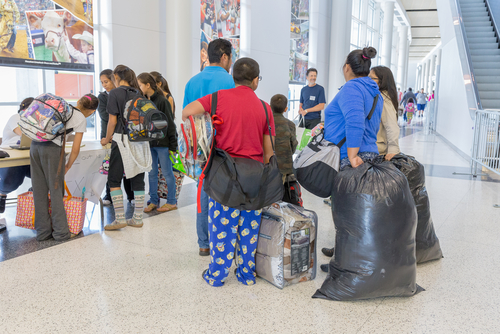Lawyers offering help to Hurricane Harvey victims include 1,600 volunteers from across the nation

New Hurricane Harvey evacuees waiting to check in to a shelter at NRG Center in Houston. michelmond / Shutterstock.com
Lawyers from legal-aid organizations and law firms have been working shifts at Texas shelters to offer free help for Hurricane Harvey victims, while at least 1,600 lawyers from across the nation have filled out a state bar form to offer their volunteer help.
Among those fielding questions is Saundra Brown, the disaster-relief manager for Lone Star Legal Aid, the Wall Street Journal (sub. req.) reports. Brown was working even though her legal aid office was damaged in an explosion and fire, and her own home was inundated with more than 5 feet of flood water.
Ellyn Josef, pro bono counsel at Vinson & Elkins, was working with others to make 26,000 copies of fliers with advice for hurricane victims who need to file insurance claims, for example, or get their children back in school.
At Kirkland & Ellis, volunteer efforts included staffers and lawyers opening their homes to flood victims, including strangers and colleagues; 11 people employed by the firm were evacuated by boat or helicopter because of the flooding, according to a press release.
See also: How you can help those affected by Hurricane Harvey
Baker Botts partner Keri Brown told the Wall Street Journal that lawyers in the shelters have been able to “answer questions people didn’t even know they had.”
Lawyers are able to help even by bringing charged laptops to shelters, according to Tracy Figueroa, the disaster assistance team manager at Texas RioGrande Legal Aid. Victims who have no internet access can use the laptops to apply for temporary housing funds through the Federal Emergency Management Agency.
Other legal concerns being addressed by lawyers include: how to obtain Social Security checks and food stamps; how to obtain a new birth certificate, whether rent must be paid when an apartment is damaged; how to file insurance claims; and how to resolve custody disputes when one parent has to relocate.



